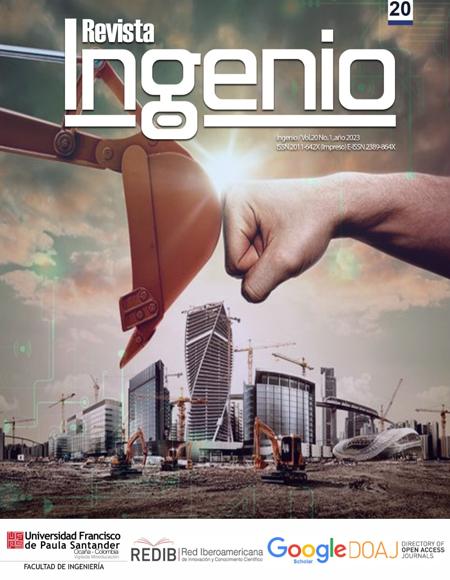Computational thinking skills in elementary school children using 4.0 technologies: a bibliometric analysis
Habilidades de pensamiento computacional en niños y niñas de las escuelas primarias utilizando tecnologías 4.0: un análisis bibliométrico
Main Article Content
Digital development has facilitated the development of technology education. This paper analyzes scientific literature on the impact of computational thinking in children. This thinking formed since childhood allows the use of technology and the development of systems that manage solutions to problems. Every day more and more scientists and educational institutions are talking about this subject, observing that topics focused on the construction of logical distinctions are being included in the academic curriculum in order to strengthen knowledge in this area. The objective is to present an analysis of different publications related to computational thinking in primary education; for this purpose, the data were collected from the Scopus database and analyzed with the VOSviewer software, 625 results were found filtered with the following search: [computational AND thinking] AND [children OR childhood]. The analysis allows identifying the most relevant authors, countries with more publications, annual growth rate, types of documents, sponsoring institutions, among others. All these scientific references show the practical and conceptual increase found in computational thinking as a way for the formation of information and communication technologies in early childhood education, thus achieving a new digital literacy.
Downloads
Article Details
E. Barrientos-Avendaño y Y. Areniz-Arévalo, “Universidad inteligente: Oportunidades y de- safíos desde la Industria 4.0”, Revista Ingenio, vol.16, n.o 1, pp. 56–60, ene. 2019. Doi: https://doi.org/10.22463/2011642X.2343
J. S. Rueda-Rueda, “El reto del desarrollo seguro de aplicaciones IoT en un mercado acelerado”, Revista Ingenio, vol. 18, n.o 1, pp. 54–61, ene. 2021. Doi: https://doi.org/10.22463/2011642X.2667
Grover, S., and Pea, R. “Computational Thinking in K–12: A Review of the State of the Field”. Educational Researcher, vol. 42(1), pp. 38–43, 2013.Doi: https://doi.org/10.3102/0013189X12463051
Wing, J. M. “Computational thinking and thinking about computing. Philosophical Transactions of the Royal Society A: Mathematical, Physical and Engineering Sciences, vol. 366(1881),3717-3725, 2008. Doi: https://doi.org/10.1098/rsta.2008.0118
Bers, M. U., Flannery, L., Kazakoff, E. R., and Sullivan, A. “Computational thinking and tinkering:Exploration of an early childhood robotics curriculum”. Computers and Education, vol. 72, pp. 145-157, 2014. Doi: https://doi.org/10.1016/j.compedu.2013.10.020
Voogt, J., Fisser, P., Good, J., Mishra, P., and Yadav, “A. Computational thinking in compulsory education: Towards an agenda for research and practice”. Education and Information Technologies, vol. 20(4), pp. 715-728. 2015. Doi: https://doi.org/10.1007/s10639-015-9412-6
Bers, M. U. “The TangibleK robotics program:Applied computational thinking for young chil- dren”. Early Childhood Research and Practice, vol. 12(2), 2010.
Posso, Miguel E. “Las “actividades desconec- tadas” y el desarrollo del pensamiento algorítmico”. http://hdl.handle.net/10785/9635
García-Peñalvo, F. J., and Mendes, A. J. “Explor- ing the computational thinking effects in pre-uni- versity education”. Computers in Human Behavior, vol. 80, pp. 407-411, 2018. Doi: https://doi.org/10.1016/j.chb.2017.12.005
Kafai, Y. B., & Burke, Q. “Computer pro- gramming goes back to school: Learning programming introduces students to solving
problems, designing applications, and mak- ing connections online”. Phi Delta Kappan, vol. 95(1), pp. 61-65, 2013. Doi: https://doi.
org/10.1177/003172171309500111
Im, H., and Rogers, C. “Draw2Code: Low-cost tangible programming for creating AR an- imations”. Paper presented at the Proceed- ings of Interaction Design and Children, IDC 2021, pp. 427-432, 2021. Doi: https://doi.org/10.1145/3459990.34651
Rocha, F., Pires, A. C., Neto, I., Nicolau, H., and Guerreiro, T. “Accembly at home: Accessible spatial programming for children with visual im- pairments and their families”. Paper presented at the Proceedings of Interaction Design and Children, IDC 2021, pp. 100-111, 2021. Doi: https://doi.org/10.1145/3459990.34606
Stower, R., and Kappas, A. “CozmoNAOts: Designing an autonomous learning task with social and educational robots”. Paper presented at the Proceedings of Interaction Design and Children, IDC 2021, pp. 542-546, 2021. Doi: https://doi.org/10.1145/3459990.34652
Olmo-Muñoz, J., Cózar-Gutiérrez, R, and González-Calero J. A. “Computational thinking through unplugged activities in early years of
Primary Education”. Computers & Education, vol. 150, 2020. Doi: https://doi.org/10.1016/j.compedu.2020.103832.
Zapata-Ros, M. (2015). Pensamiento computacional: Una nueva alfabetización digital. RED - Revista de Educación a Distancia, 46, 1-47. Doi: https://doi.org/10.6018/red/45/4




 Perfil Google Scholar
Perfil Google Scholar



